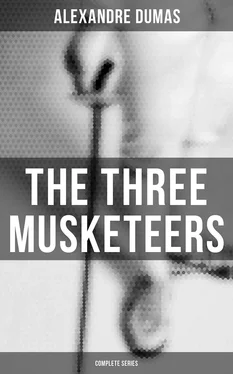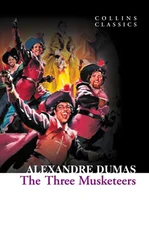“Truly?”
“Honor! Luckily for the rascal, for I should have left him dead on the spot, I assure you.”
“And what has became of him?”
“Oh, I don’t know; he had enough, and set off without waiting for the rest. But you, my dear d’Artagnan, what has happened to you?”
“So that this strain of the knee,” continued d’Artagnan, “my dear Porthos, keeps you in bed?”
“My God, that’s all. I shall be about again in a few days.”
“Why did you not have yourself conveyed to Paris? You must be cruelly bored here.”
“That was my intention; but, my dear friend, I have one thing to confess to you.”
“What’s that?”
“It is that as I was cruelly bored, as you say, and as I had the seventy-five pistoles in my pocket which you had distributed to me, in order to amuse myself I invited a gentleman who was traveling this way to walk up, and proposed a cast of dice. He accepted my challenge, and, my faith, my seventy-five pistoles passed from my pocket to his, without reckoning my horse, which he won into the bargain. But you, my dear d’Artagnan?”
“What can you expect, my dear Porthos; a man is not privileged in all ways,” said d’Artagnan. “You know the proverb ‘Unlucky at play, lucky in love.’ You are too fortunate in your love for play not to take its revenge. What consequence can the reverses of fortune be to you? Have you not, happy rogue that you are—have you not your duchess, who cannot fail to come to your aid?”
“Well, you see, my dear d’Artagnan, with what ill luck I play,” replied Porthos, with the most careless air in the world. “I wrote to her to send me fifty louis or so, of which I stood absolutely in need on account of my accident.”
“Well?”
“Well, she must be at her country seat, for she has not answered me.”
“Truly?”
“No; so I yesterday addressed another epistle to her, still more pressing than the first. But you are here, my dear fellow, let us speak of you. I confess I began to be very uneasy on your account.”
“But your host behaves very well toward you, as it appears, my dear Porthos,” said d’Artagnan, directing the sick man’s attention to the full stewpans and the empty bottles.
“So, so,” replied Porthos. “Only three or four days ago the impertinent jackanapes gave me his bill, and I was forced to turn both him and his bill out of the door; so that I am here something in the fashion of a conqueror, holding my position, as it were, my conquest. So you see, being in constant fear of being forced from that position, I am armed to the teeth.”
“And yet,” said d’Artagnan, laughing, “it appears to me that from time to time you must make SORTIES.” And he again pointed to the bottles and the stewpans.
“Not I, unfortunately!” said Porthos. “This miserable strain confines me to my bed; but Mousqueton forages, and brings in provisions. Friend Mousqueton, you see that we have a reinforcement, and we must have an increase of supplies.”
“Mousqueton,” said d’Artagnan, “you must render me a service.”
“What, monsieur?”
“You must give your recipe to Planchet. I may be besieged in my turn, and I shall not be sorry for him to be able to let me enjoy the same advantages with which you gratify your master.”
“Lord, monsieur! There is nothing more easy,” said Mousqueton, with a modest air. “One only needs to be sharp, that’s all. I was brought up in the country, and my father in his leisure time was something of a poacher.”
“And what did he do the rest of his time?”
“Monsieur, he carried on a trade which I have always thought satisfactory.”
“Which?”
“As it was a time of war between the Catholics and the Huguenots, and as he saw the Catholics exterminate the Huguenots and the Huguenots exterminate the Catholics—all in the name of religion—he adopted a mixed belief which permitted him to be sometimes Catholic, sometimes a Huguenot. Now, he was accustomed to walk with his fowling piece on his shoulder, behind the hedges which border the roads, and when he saw a Catholic coming alone, the Protestant religion immediately prevailed in his mind. He lowered his gun in the direction of the traveler; then, when he was within ten paces of him, he commenced a conversation which almost always ended by the traveler’s abandoning his purse to save his life. It goes without saying that when he saw a Huguenot coming, he felt himself filled with such ardent Catholic zeal that he could not understand how, a quarter of an hour before, he had been able to have any doubts upon the superiority of our holy religion. For my part, monsieur, I am Catholic—my father, faithful to his principles, having made my elder brother a Huguenot.”
“And what was the end of this worthy man?” asked d’Artagnan.
“Oh, of the most unfortunate kind, monsieur. One day he was surprised in a lonely road between a Huguenot and a Catholic, with both of whom he had before had business, and who both knew him again; so they united against him and hanged him on a tree. Then they came and boasted of their fine exploit in the cabaret of the next village, where my brother and I were drinking.”
“And what did you do?” said d’Artagnan.
“We let them tell their story out,” replied Mousqueton. “Then, as in leaving the cabaret they took different directions, my brother went and hid himself on the road of the Catholic, and I on that of the Huguenot. Two hours after, all was over; we had done the business of both, admiring the foresight of our poor father, who had taken the precaution to bring each of us up in a different religion.”
“Well, I must allow, as you say, your father was a very intelligent fellow. And you say in his leisure moments the worthy man was a poacher?”
“Yes, monsieur, and it was he who taught me to lay a snare and ground a line. The consequence is that when I saw our laborers, which did not at all suit two such delicate stomachs as ours, I had recourse to a little of my old trade. While walking near the wood of Monsieur le Prince, I laid a few snare in the runs; and while reclining on the banks of his Highness’s pieces of water, I slipped a few lines into his fish ponds. So that now, thanks be to God, we do not want, as Monsieur can testify, for partridges, rabbits, carp or eels—all light, wholesome food, suitable for the sick.”
“But the wine,” said d’Artagnan, “who furnishes the wine? Your host?”
“That is to say, yes and no.”
“How yes and no?”
“He furnishes it, it is true, but he does not know that he has that honor.”
“Explain yourself, Mousqueton; your conversation is full of instructive things.”
“That is it, monsieur. It has so chanced that I met with a Spaniard in my peregrinations who had seen many countries, and among them the New World.”
“What connection can the New World have with the bottles which are on the commode and the wardrobe?”
“Patience, monsieur, everything will come in its turn.”
“This Spaniard had in his service a lackey who had accompanied him in his voyage to Mexico. This lackey was my compatriot; and we became the more intimate from there being many resemblances of character between us. We loved sporting of all kinds better than anything; so that he related to me how in the plains of the Pampas the natives hunt the tiger and the wild bull with simple running nooses which they throw to a distance of twenty or thirty paces the end of a cord with such nicety; but in face of the proof I was obliged to acknowledge the truth of the recital. My friend placed a bottle at the distance of thirty paces, and at each cast he caught the neck of the bottle in his running noose. I practiced this exercise, and as nature has endowed me with some faculties, at this day I can throw the lasso with any man in the world. Well, do you understand, monsieur? Our host has a well-furnished cellar the key of which never leaves him; only this cellar has a ventilating hole. Now through this ventilating hole I throw my lasso, and as I now know in which part of the cellar is the best wine, that’s my point for sport. You see, monsieur, what the New World has to do with the bottles which are on the commode and the wardrobe. Now, will you taste our wine, and without prejudice say what you think of it?”
Читать дальше












